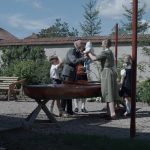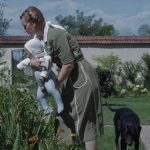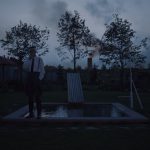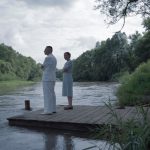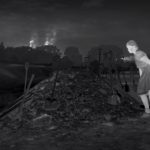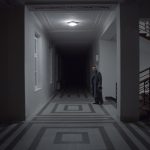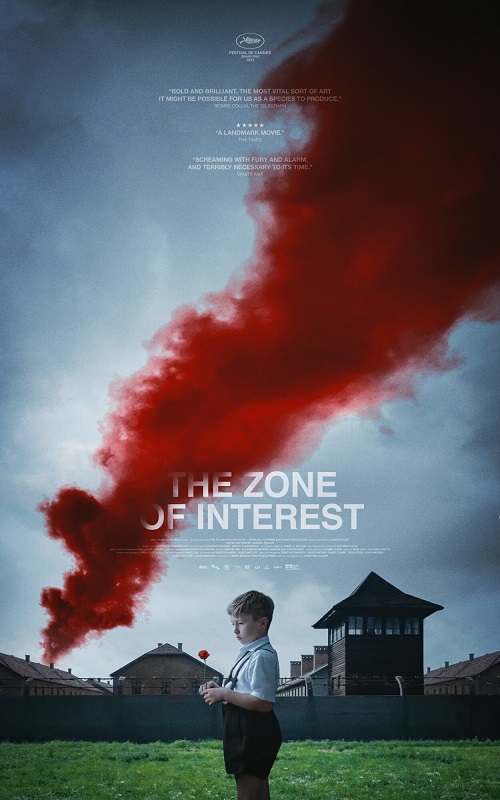

2023 – The Zone of Interest
This movie was ok. It kept my interest well enough while I was watching it. But the more I think about it, the more I am of the opinion that it was way too slow, way too self-important, and was trying way too hard to be deep or emotionally impactful. What it was, was an examination of yet another perspective on the absolute tragedy that was the Holocaust. I think the reason it was able to keep my attention is that I have never seen a film about that terrible time in history, told from this particular perspective, that of the Auschwitz commandant, Rudolf Höss and his wife Hedwig, who live with their family in a home in the “Zone of Interest” next to the concentration camp.
The film seemed to be extremely minimalist. The viewer sees it as a fly on the wall. The actors almost never played to the camera, which was generally in a fixed position, while the characters came in and out of the frame, going about their daily lives. There were three colors that were used in very specific ways in the film, white, red, and black. There were three times in the movie in which the entire screen turned those colors for long stretches. White: thirteen seconds, while we listened to the screaming and crying of people that we never see. Red: twenty-one seconds, while we listen to a man screaming, as if being tortured, and is abruptly cut off into silence. Black: at the end of the film, a full sixty seconds, right before the end credits, as we listen to incredibly dissonant music that sounded like orchestrated wailing and lamenting.
That was just one example of how the film was trying too hard to be deep. Was it really effective story-telling, good filmmaking, or just pretentious and heavy handed? I don’t know. And there were other things that were, I think, supposed to be emotionally jarring, but for me, were only effective in slowing down the narrative, sparse as it was. But it wasn’t all ineffective. There were some things that were meant to be disturbing, and actually were, in a very meaningful way.
The story, what there was of it, can be summarized quickly. Höss and Hedwig have a beautiful home and a beautiful family. They are happy and healthy. But they live next to Auschwitz. Their home is beautiful as long as they can ignore what is going on over the wall, the frequent screaming and gunshots, the smell of the smoke coming out of the slaughter-houses. Hedwig gets regular deliveries of beautiful things like a fur coat, or lipstick, or a diamond found hidden in a tube of tooth-paste, even though she knows perfectly well where they are coming from. But she accepts the deliveries, because they only belonged to Jews.
One day, Rudolph gets transferred, and rather than move out of her dream-home, Hedwig chooses to stay. Rudolph is promoted to deputy inspector of concentration camps, and the loving couple are parted. At Auschwitz, the killing and the death gets ramped up, and the sounds of trains increases. Höss, himself, was shown to be an integral part of the mass genocide. The end of the film was pretty impactful. To quote Wikipedia, “As Höss leaves his Berlin office and descends a stairway, he stops, retches repeatedly and stares into the darkness of the building corridors. In the present day, a group of janitors cleans the Auschwitz-Birkenau State Museum. Back in 1944, Höss continues downstairs, descending into darkness.”
And that’s what this movie does so effectively. It sheds light on the level of both denial and indifference that was perpetrated by the German Nazis and their families, and yet shows that they were humans, too. They were normal people with hopes and aspirations, loves and cares, just like anyone. Were they good people? Were they evil? At the very least, Rudolph was shown to have a conscience, at the end. He was aware that he was a monster, and yet his awareness didn’t stop him from being that monster. And did Hedwig’s heartless indifference to her husband’s work and the nearby suffering at the concentration camp make her just as bad?
This was a dark movie, and though it was based on real people and events, I don’t mean just the content. I mean that the images on the screen were sometimes very dim and barely lit. There were a few sequences showing a young Polish girl hiding food for forced laborers at night, that were shown in black and white negative, so that the girl was white, and everything around her was black. It was done for effect, but it was just another way to force the emotional content. It was interesting, but very dark on the screen. Also, the movie was entirely in German. I don’t mind reading subtitles, but sometimes they were too fast for me to read, and I had to rewind just a little bit to understand what was being said.
And finally, I have to quickly mention the acting of the two leads, Christian Freidel as Rudolph, and Sandra Hüller as Hedwig. They were both good, but I particularly liked Hüller, and found it interesting that she was also in another Best Picture nominee for 2023, Anatomy of a Fall, for which she was nominated for Best Actress. She apparently had a busy year, and I’m glad she was recognized for her work. And though this didn’t win the Best Picture award, and I’m glad it didn’t, it did win the Best International Film Oscar, and that’s good.
